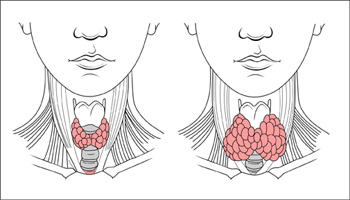What is a Goiter?
 It is an abnormal enlargement of the thyroid gland which is located in the lower front of the neck, next to the wind pipe or trachea. The thyroid gland makes thyroid hormone which helps control our body’s metabolism or energy use. A person with a goiter can have normal amounts of thyroid hormone, too much, or too little. Goiters are common in many parts of the world and are usually do not cause any harm.
It is an abnormal enlargement of the thyroid gland which is located in the lower front of the neck, next to the wind pipe or trachea. The thyroid gland makes thyroid hormone which helps control our body’s metabolism or energy use. A person with a goiter can have normal amounts of thyroid hormone, too much, or too little. Goiters are common in many parts of the world and are usually do not cause any harm.
How would I know if I had a goiter?
Most people with goiter do not have symptoms. Some people feel a lump in their neck. Those that have very large goiters sometimes have complaints related to appearance. They can also have trouble breathing and cough if the goiter is pushing on the wind pipe or trouble swallowing if it is pushing on the food pipe.
If the goiter is producing thyroid hormone, people have symptoms of having too much thyroid hormone which are insomnia, feeling tired, losing weight without trying, having a fast heartbeat, and having frequent bowel movements. If the goiter is the result of too little thyroid hormone, people can have symptoms of weight gain, dry skin, depression, feeling abnormally cold, irregular periods, and tiredness.
What causes goiter?
There are many different causes of goiter. In developing countries, iodine deficiency is the most common cause. The thyroid gland uses iodine to make thyroid hormone; if there is not enough iodine, there is not enough thyroid hormone. When there is not enough thyroid hormone, the body sends signals to increase the size of the thyroid gland to help make more. In developed countries such as the United States, more common causes include Hashimoto’s disease, Grave’s disease, and thyroiditis. Hashimoto’s disease is when our body’s immune system destroys the thyroid gland causing low levels of thyroid hormone. Grave’s disease is when our body makes a protein that causes growth of the thyroid gland which leads to high levels of thyroid hormone. Both Grave’s disease and Hashimoto’s disease can be due to a genetic predisposition and affect multiple family members. Thyroiditis is a temporary inflammation of the thyroid gland caused by a virus or pregnancy. Tumors, both benign and cancerous can also cause goiters. Other causes of goiter include certain medications and radiation exposure.
Who gets goiters?
Anyone can get a goiter. It is more common in women, people over the age of 50, people living in iodine deficient areas, people with a family history of autoimmune disease, people who have had radiation exposure to the neck or chest, and people taking certain medications such as lithium, amiodarone, antiretrovirals, or immunosuppressants,
How do you diagnose a goiter?
Usually, the diagnosis is made by physical examination. Sometimes, it is found due to abnormal levels of thyroid hormone. It is always important to find out what is causing the goiter. In order to do this, the doctor will order blood tests to check the levels of thyroid hormone. Depending on these results, the next step may be a radioactive iodine scan (a scan to see if all of the enlarged thyroid is working), a thyroid ultrasound (a test that uses sound waves to look at the structure of the thyroid gland), or a fine needle aspiration biopsy (where a small piece of the thyroid is taken out to see if it is cancerous). Sometimes a CT scan or MRI is needed if the goiter extends into the chest.
What is the treatment of goiter?
The treatment of goiter depends on the specific cause. Often, the goiter is not causing any problems and observation is the only necessary intervention. If the goiter is resulting in too much thyroid hormone, medications such as methimazole or propylthiouracil may be used. If there is too little thyroid hormone, a medication called levothyroxine or Synthroid ® is commonly prescribed. Radioactive iodine may be used to kill overactive thyroid gland cells. Surgical removal of all or part of the thyroid gland is also done in certain cases. There should be at least yearly follow-up of all people diagnosed with goiter regardless of the cause and even if no specific therapy is given.
